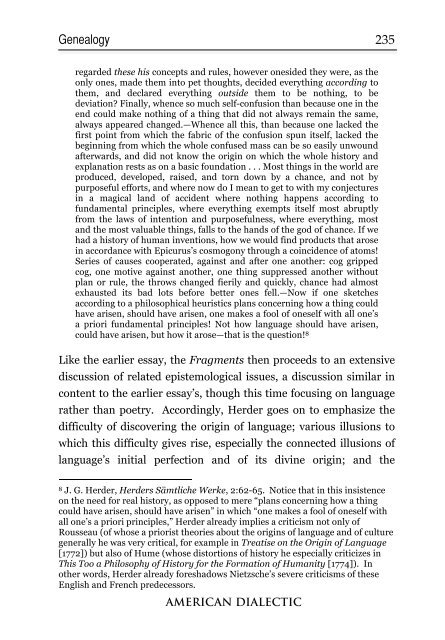Genealogy Michael Forster - American Dialectic
Genealogy Michael Forster - American Dialectic
Genealogy Michael Forster - American Dialectic
You also want an ePaper? Increase the reach of your titles
YUMPU automatically turns print PDFs into web optimized ePapers that Google loves.
<strong>Genealogy</strong><br />
regarded these his concepts and rules, however onesided they were, as the<br />
only ones, made them into pet thoughts, decided everything according to<br />
them, and declared everything outside them to be nothing, to be<br />
deviation? Finally, whence so much self-confusion than because one in the<br />
end could make nothing of a thing that did not always remain the same,<br />
always appeared changed.—Whence all this, than because one lacked the<br />
first point from which the fabric of the confusion spun itself, lacked the<br />
beginning from which the whole confused mass can be so easily unwound<br />
afterwards, and did not know the origin on which the whole history and<br />
explanation rests as on a basic foundation . . . Most things in the world are<br />
produced, developed, raised, and torn down by a chance, and not by<br />
purposeful efforts, and where now do I mean to get to with my conjectures<br />
in a magical land of accident where nothing happens according to<br />
fundamental principles, where everything exempts itself most abruptly<br />
from the laws of intention and purposefulness, where everything, most<br />
and the most valuable things, falls to the hands of the god of chance. If we<br />
had a history of human inventions, how we would find products that arose<br />
in accordance with Epicurus’s cosmogony through a coincidence of atoms!<br />
Series of causes cooperated, against and after one another: cog gripped<br />
cog, one motive against another, one thing suppressed another without<br />
plan or rule, the throws changed fierily and quickly, chance had almost<br />
exhausted its bad lots before better ones fell.—Now if one sketches<br />
according to a philosophical heuristics plans concerning how a thing could<br />
have arisen, should have arisen, one makes a fool of oneself with all one’s<br />
a priori fundamental principles! Not how language should have arisen,<br />
could have arisen, but how it arose—that is the question! 8<br />
AMERICAN DIALECTIC<br />
235<br />
Like the earlier essay, the Fragments then proceeds to an extensive<br />
discussion of related epistemological issues, a discussion similar in<br />
content to the earlier essay’s, though this time focusing on language<br />
rather than poetry. Accordingly, Herder goes on to emphasize the<br />
difficulty of discovering the origin of language; various illusions to<br />
which this difficulty gives rise, especially the connected illusions of<br />
language’s initial perfection and of its divine origin; and the<br />
8 J. G. Herder, Herders Sämtliche Werke, 2:62-65. Notice that in this insistence<br />
on the need for real history, as opposed to mere “plans concerning how a thing<br />
could have arisen, should have arisen” in which “one makes a fool of oneself with<br />
all one’s a priori principles,” Herder already implies a criticism not only of<br />
Rousseau (of whose a priorist theories about the origins of language and of culture<br />
generally he was very critical, for example in Treatise on the Origin of Language<br />
[1772]) but also of Hume (whose distortions of history he especially criticizes in<br />
This Too a Philosophy of History for the Formation of Humanity [1774]). In<br />
other words, Herder already foreshadows Nietzsche’s severe criticisms of these<br />
English and French predecessors.


